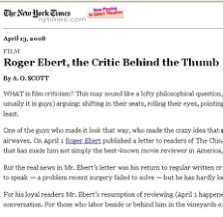 In an otherwise heartfelt and thoughtful tribute to Roger Ebert, who recently announced he is officially retiring from his TV show, A.O. Scott of the New York Times ponders the state of film criticism:
In an otherwise heartfelt and thoughtful tribute to Roger Ebert, who recently announced he is officially retiring from his TV show, A.O. Scott of the New York Times ponders the state of film criticism:
…if the future looked grim back in 1990 — when Entertainment Weekly’s letter grades and the proliferation of Siskel and Ebert knockoffs seemed to threaten the integrity of the critical enterprise — what must it look like now that the Internet is gobbling up all discourse?
Is the Internet really ‘gobbling up discourse?’ This sounds like a case of someone in a big media Ivory Tower imagining a horde of digital barbarians at his gate.
But – as I’ve argued before – surely the Internet is actaully enabling discourse?
He goes on:
If a star- or thumb-based rating system was the enemy of nuance and complex thought, what are we to make of the splattered fruit at rottentomatoes.com or the numerical averages at metacritic.com?
Are review aggregators like Rotten Tomatoes and Metacritic a bad thing? Clearly it is stupid to merely reduce a film’s quality to a percentage or grade, but the benefit of these sites is that they introduce you to new writers and give you a greater awareness of the differences of opinion out there.
But wait, there is more:
If you spend time prowling the blogs, you may discover that the problem is not a shortage of criticism but a glut: an endless, sometimes bracing, sometimes vexing barrage of deep polemic, passionate analysis and fierce contention reflecting nearly every possible permutation of taste and sensibility.
Is this plurality of voices a worrying trend? It can make finding the good stuff harder, but do we really want a quasi-Soviet style system where a few big outlets set the ‘approved’ cultural agenda?
The use of the word ‘prowling’ (look up the definition) seems to imply that Tony was looking for bad blogs to justify his point.
But the real mistake here is not actually saying – or linking to – which ‘blogs’ he is referring to. It is as vague as saying you spend time reading ‘the newspapers’ or watching ‘the TV channels’.
Does he mean blogs like GreenCine Daily? Scanners? Hollywood Elsewhere? Spout Blog? Sergio Leone and the Infield Fly Rule? The Hot Blog? Matt Zoeller Seitz? In Contention? Thompson on Hollywood? All of these are intelligent places for the discussion of films and far from the ‘angry-amateur’ media stereotype of the faceless ‘blogger’.
The irony here of course is that Tony and his colleague Manohla Dargis are usually two of the best film writers you can read on the web. They happen to work for the New York Times, which admittedly gives them a huge platform both in tradional print and online, but I think both could find an audience and make their mark online even if they weren’t employed by the Gray Lady.
Unlike some doom merchants I am actually optimistic about the state of quality film writing – considered and intelligent pieces will spark discussion and stand out amongst the cacophony of snap judgements, ill considered rants and fanboy droolings that can proliferate on certain sites.
A further irony is Roger Ebert has long been one of the most web savvy of film critics, making his reviews available on the web and responding to his readers questions about interesting aspects of movies.
That engagement with his audience is another reason why he is so highly regarded by his peers and readers.
> Full A.O. Scott article at the NY Times
> Roger Ebert’s website